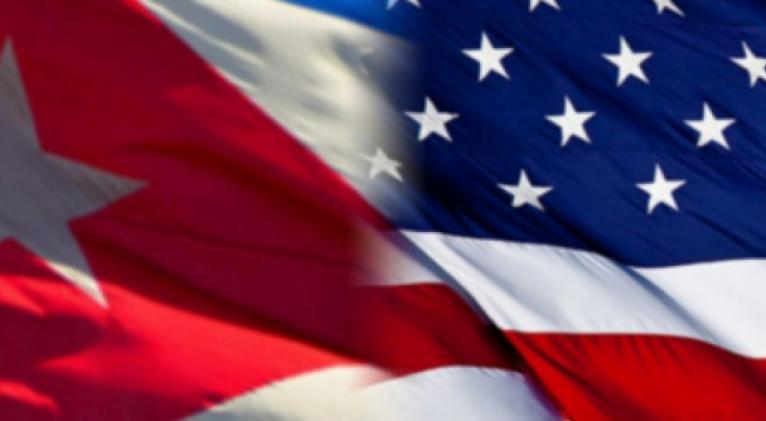Cuba-USA, One Step Ahead and Still Much to Do
especiales

The agreement announced to reestablish diplomatic relations between the United States and Cuba is a step forward, but is just the beginning of a complex process towards bilateral normalization of relations, experts and media outlets agreed in saying.
This assertion has been admitted by officials from both countries, during successive round of talks in their respective capitals that were good to reach the agreement confirmed by Cuban President Raul Castro and his US peer Barack Obama.
The governments of both countries told the world on July 1 that they would reestablish those relations immediately and would open later, within a reasonable period the respective embassies in Havana and Washington.
According to the newspaper The Wall Street Journal, this was a significant victory to Obama, who had supported the reestablishment of the relations with Cuba since his presidential campaign in 2008.
As it was planned, the embassies would be the same buildings that are currently used as Interest Sections in the two countries, which would stop working with that special status, granted since they were established in September, 1977, during President James Carter's Administration (1977-1981).
The panorama between both neighboring countries had a turning point on December 17, when Cuban President and his US peer reported the decision to reestablish diplomatic relations after negotiations for several months with that goal.
Despite the steps taken in that direction in recent months, what Havana considers the main hindrance to the normalization of relations, being the economic, trade and financial blockade, is still in force and has caused damage for more than $1 trillion and $112.5 billion USD to the Cuban people. The demand that the United States returns to Cuba the territory illegally occupied by Guantanamo naval base, located in the eastern end of the island, is included in the list of pending issues.
Besides, the Caribbean nation is demanding to stop the illegal radio and television Marti broadcasts, because they violate the national sovereignty and are in contradiction with important international agreements in the area of telecommunications.
Washington has among its priorities, the "normal" work by its diplomatic officials in Havana, something that both sides have agreed that should be based on the premises of the Vienna Convention and the United Nations Charter.
In numerous occasions, the Cuban authorities have denounced activities they call subversive by officials of the US Interest Section in Havana.
To the United States, it is also important to discuss the issues of compensations for the properties nationalized at the beginning of the Revolution led by Fidel Castro, and Havana ratified its willingness to discuss this and any other issue of bilateral interest.
Cuba is also demanding that the programs aimed at fostering internal subversion and destabilization and that the Cuban people are compensated for the human and economic damage caused by the US policies.
The recent exclusion of the Caribbean island from the list of nations that according to Washington are sponsoring terrorism was outstanding as part of the progress made since December 17, announced on May 29 by the US State Department.
The decision was ratified on June 4, with the publication of the text in the Federal Register, a sort of official daily publication by the US Government, little less than a week after the State Department reported the expiry of the 45-day deadline for the Congress to make a statement on the issue.
Another step in the same direction was reestablishment of bank services of the Cuban Interest Section in Washington, an essential aspect to the normal development of the office's activities.
In that context, legislators that came to Cuba in recent weeks agreed in saying that there was bipartisan consensus in favor of lifting the unilateral sanctions.
It was expressed by the emeritus temporary president of the Senate, Democratic Senator Patrick Leahy in a media conference at the hotel Saratoga in Havana, accompanied by his fellow Democrat Benjamin Cardin and Republican Dean Heller.
According to Leahy, just a small minority at the Capitol supports keeping the blockade and an overwhelming majority of the US people favors rapprochement between the two neighboring nations.
A similar opinion was also expressed here before by his fellow Democrat Tom Udall, who asserted that even in the Senatorial Committee of Foreign Affairs, there was consensus about the need to eliminate the punitive measures against Havana, although there was still much to do to change that desire into concrete actions.
Udall co-sponsors, together with Republicans Jeff Flake and Mike Enzi, as well as Democrat Dick Durban, a bill presented in the middle of May, aimed at fostering communication business by US companies in Cuba.
With the explicit goal of making more complex the path to normalization of the bilateral relations, ultra-right sectors in the US Congress presented bills aimed at neutralizing the White House initiatives and increasing the funds for subversion in the Caribbean island.
However, President Obama warned that he was willing to veto these measures related to Cuba, because they tackle foreign policy issues that are mostly the Executive's prerogative.
These maneuvers were supported by Senator Marco Rubio, nominee to the elections in November 2016, who sponsors a proposal in the Senate, similar to that by the House to ban financial transactions with specific Cuban companies or entities.
Rubio's initiatives include a recent bill to try to establish a series of requirements to comply with in the supposed case that Obama decided to return to Cuba the territory occupied by Guantanamo naval base.
The president himself, in his speech at the White House, request that the congress lifted the blockade against Cuba and criticized those in the Capitol that are trying to keep a policy that failed in the last 50 years and was counterproductive to the United States.













Add new comment